Over the years, we’ve helped over 4000 businesses speed up their WordPress sites. Using that experience and our knowledge, we’ve crafted this article to help you choose and implement the best WordPress speed optimization plugins for your business.
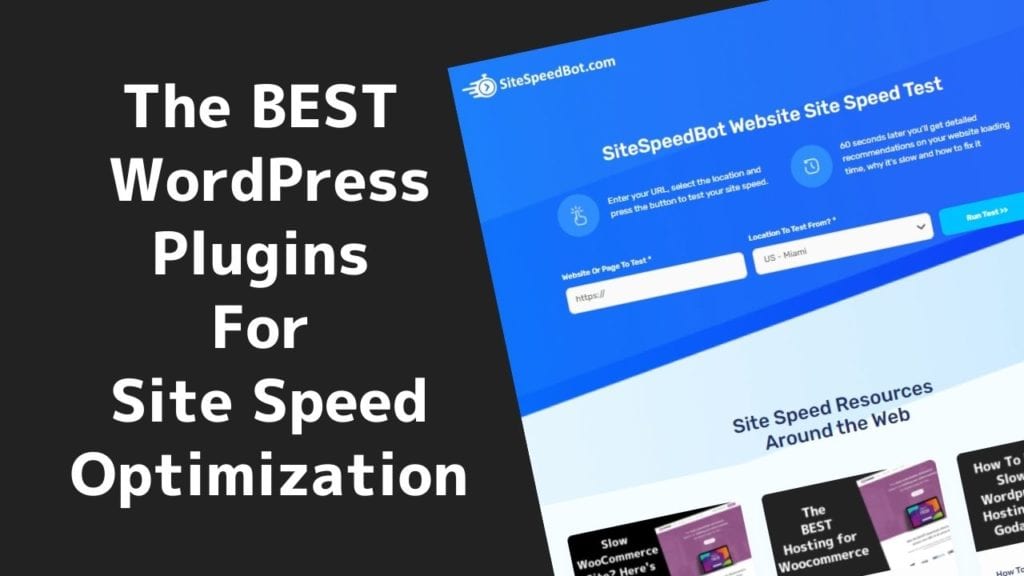
The easiest way to ensure that your site runs at the optimal level is to use a few handy WordPress speed optimization plugins that can significantly improve your site’s performance. Keep in mind that you can only install one or two plugins before things start working against you — it’s best to just pick one or two and test them thoroughly.
That’s exactly why we created this post; to help you choose the right plugin for the job that not only improves your site speed, but user experience as well. The list will also help you minimize the number of work necessary to get the job done while maximizing the results you’ll see. So let’s begin!
Table of Contents
Best Caching Plugins
Caching is the process of storing data in a temporary storage location, otherwise known as a cache. This cuts down the time needed for the visitor’s request to be processed and the information is served in a much faster manner.
Most web hosts and themes come with built-in caching features, such as memcache or Redis, but if that’s not the case with your provider, there are plenty of plugins that will perform the same task and speed up your site’s loading time by showing a certain amount of content to the user before the rest of the page is loaded.
The plugins we’ve selected are some of the best that WordPress has to offer, so let’s briefly review each.
WP Rocket

WP Rocket is the most user-friendly caching plugin on our list. It’s highly effective as well, which is why we use it for our sites and always recommend it as the best one out there.
The whole process of getting WP Rocket to work doesn’t take much time, and all of the parameters that can be set and cached are clearly displayed, and can easily be modified depending on what your website needs. Ease of use makes WP Rocket stand out as the most accessible caching plugin and the best choice for administrators with not much experience in running sites or using plugins.
On the other hand, if you’re running an eCommerce-focused site, many more specific inputs are needed when it comes to determining which data should and should not be cached. As stated before, it’s possible to change certain settings in WP Rocket, but remember that these changes can only affect page and web caching options.
W3 Total Cache

Unlike WP Rocket, W3 is a fairly technical caching plugin, specialized in data caching for sites that generate lots of traffic daily, as well as for those that require the caching to be done on a page-by-page level.
Caching on a page-by-page basis adjusts the data which will be cached on any page of your website. This method is essential for product-based eCommerce sites, since a mistake in the caching of the product or the customer data can cause irreversible damage, such as data being manipulated, or accidentally leaked.
Anyway, it’s important to note that with the highly specific nature of this plugin’s features, the administrator will need some prior experience to use W3 constructively. A person without previous knowledge about sites and plugins is still going to be able to use it, but it might take some time before they catch on to it.
Redis Object Cache

If you’re looking for a caching plugin for a site with a large number of daily visits and you have a knowledgeable administrator, Redis is the perfect choice. Remember that in case you’re not very experienced with caching plugins, WP Rocket is still the best solution.
As you can tell by its name, Redis is an optimization plugin specialized in object caching. It comes with numerous different features such as replication, clustering, sharding, cache prefetching, and analytics options. Redis is a WordPress API compliant plugin that supports the latest version of PHP.
Similar to W3, using Redis will require a bit more experience and knowledge about caching and which methods should be used to ensure the best performance.
Uptime Monitoring
Once you’ve sorted your caching, you should move onto Uptime monitoring.
Ensuring that your site is online at all times is important if you want to avoid your clients moving on to some of your competitors, especially if you’re running an eCommerce site.
Sites go offline for many different reasons, such as server problems, network routers, broken plugins, etc., so monitoring your website performance and uptime is essential. Also, there are some other factors to worry about such as occasional speed drops or unreliable connections. And given that any of this can happen at very infrequent intervals, which makes it virtually impossible for a human to track, you will need a plugin to perform this task.

Our tool of choice for this purpose is UptimeRobot. This plugin will be very useful in keeping up with everything that’s happening on your site in terms of generated speeds, frequent site lags, the average amount of downtime that you can expect on your site, etc.
Alongside website monitoring, UptimeRobot brings several other great additional monitoring options. SSL monitoring will track the expiry day of your certificate. Heartbeat monitoring will be in charge of sending the requests and checking if they arrive on time. Ping and port monitoring will take care of specific port or ping services.
High Quality, High-Performance Hosting
Good hosting is one of the cornerstones of your website’s performance and is crucial for speed. Keep in mind that a low-quality provider could never be compensated with any number of plugins, no matter how great they are.
If you aren’t provided with enough bandwidth, if your allowed daily visitor number is too low, or if you’re experiencing constant drops in site speed, then it might be time to consider switching services. Or in case your business has grown, or its requirements have changed, or even if you feel like change is a good idea, then, again, we suggest you consider moving to a better host. Below, you’ll find some information about the hosting providers we usually recommend.
Cloudflare
Cloudflare is our top choice when speaking of hosting providers, which usually ranks as the fastest host in the world. It comes with a bunch of benefits and features built in to help improve your site, like a CDN service, firewalling, and website acceleration service, to name a few.
Later on, we suggest you consider using Cloudflare’s APO service. Automatic Platform Optimization (APO) is a type of edge caching that you can get for as little as $5. This means that your entire pages will be stored on Clouflare’s servers, which is why they’ll be sent faster to visitors. This drastically improves the site’s overall performance. We’ll talk more about Cloudflare and why we recommend it to all our clients in the CDN part of this article.
Siteground
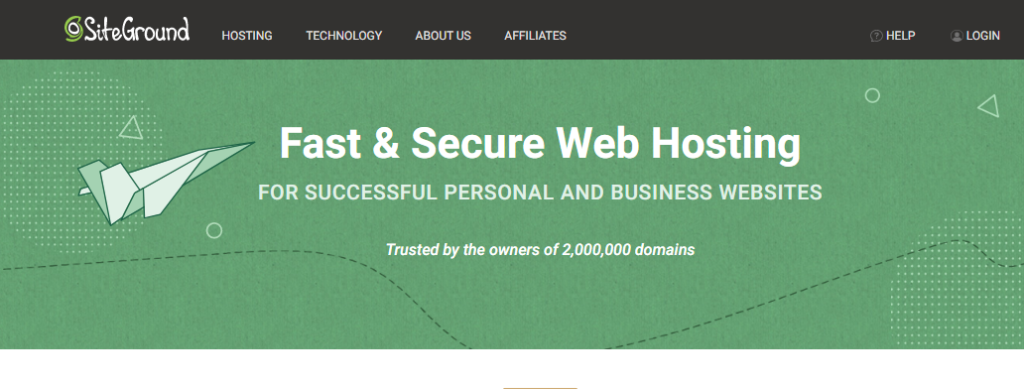
With so many different companies in the web hosting business, choosing the right one might be challenging, especially for inexperienced site administrators. That’s one of the reasons why Siteground is always among our top suggestions when it comes to web hosting.
This provider offers great service that can easily put up with the needs of different types of websites and can be run by both experienced and inexperienced administrators.
Siteground brings many free perks, such as email, SSL certificates, and daily backups and updates, as well as a free CDN (Content Delivery Network) service that will allow you to reroute your site signal through servers all around the globe. It also has a free migration option in case you want to relocate your site. It can even include unrestricted bandwidth, which is essential for large sites, but can be very helpful for the small ones as well.
Cloudways
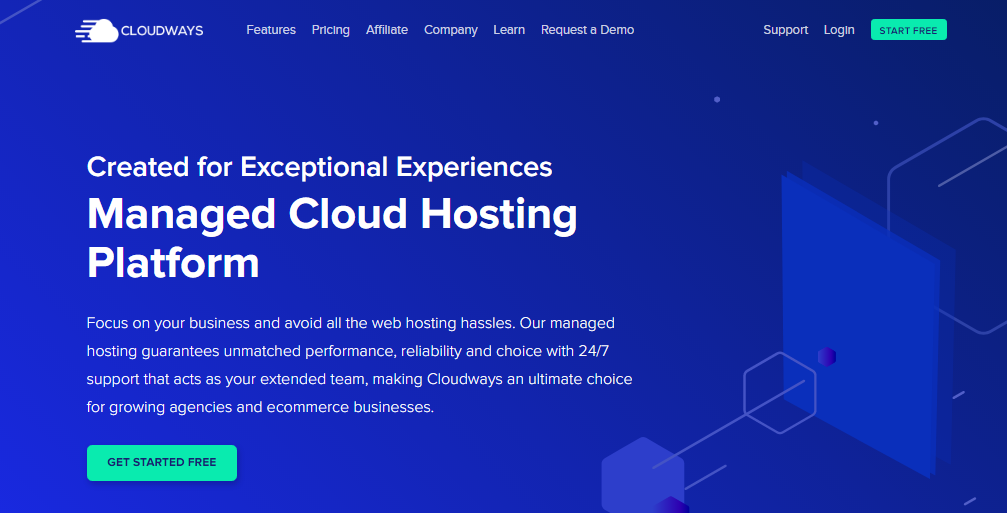
Cloudways is your one-stop shop when speaking of web hosts. It offers a large variety of plans ranging from $10 a month to just under $300. The key factors you should consider when picking your plan are the size and requirements of your business and website, the data centers’ vicinity, RAM size, storage, the processing power you’d like to have at your disposal, and bandwidth.
Any Cloudways plan you choose comes with some great features, such as the same SSL certificates, CDN services, and free migration options that are a must-have for every good hosting service. On top of that, you’ll be provided with around-the-clock support, an unlimited number of apps, multiple databases, and more.
WPX Hosting

WPX servers have locations both in the UK and the US. Usually, this would imply that only users from those two countries would be able to create a stable connection to your site. With WPX, though, this is not the case, since it also comes with a complimentary CDN service that will distribute your data from servers located throughout the world.
WPX is popular for its top-tier speeds at low prices, as well as some very solid security measures. The service provides you with DDoS protection, and also comes with daily scans and malware removal features.
Kinsta
As stated earlier, every good web host includes free CDN services and SSL certificates, and so does Kinsta. It offers various plans that include between 10 and 200+ GB of disc space, 25,000 to 3 million visits, and either 1 or 150+ WordPress installs.
Another plus for Kinsta is that it comes with no fixed-term contract, which is very rare among the hosting providers who usually sign year-long deals. Anyway, if you choose to go for a yearly agreement, you’ll also have a 30-day money-back guarantee, as well as the option to upgrade or downgrade the plan, whether your contract is for a set time or not.
WP Engine

Similar to Kinsta, WP Engine also includes a CDN service. They also do the caching at the server level without the need for caching plugins.
WP Engine uses the latest and most up-to-date technology which will significantly boost your website’s performance and improve its user experience. Another great thing about WP Engine is that it’s constantly optimizing and making a safer zone for your website.
CDN
All hosts we suggested above include free CDN services, but don’t get tricked into thinking that it’s all you have on offer.
The main goal of a CDN is to distribute your website on numerous servers globally so they can be quickly accessed by local users. This eliminates the need for the data to be stored solely on just your hosting provider’s servers (further reducing pressure). Especially for international users, this can be a huge boost in their perceived speed.
In case you are still not ready to move your hosting to any of the previously noted providers but would like to have the services of a top-class CDN, we strongly suggest you subscribe to Cloudflare.
Cloudflare

Cloudflare’s DNS (Domain Network System) hosting is amongst the fastest in the world. DNS is responsible for bringing your site to visitors who typed the address into the URL bar, but good DNS hosting will improve your site’s speed significantly.
Cloudflare consistently ranks as one of the greatest CDN and DNS providers. This is mainly because of their large number of servers located all over the planet that can assure high-speed connections to all of your site’s visitors. Even if your hosting plan already includes CDN, Cloudflare’s is probably superior to it when speaking of both scope and performance.
Cloudflare also comes with firewall and security features, which will provide your site with better protection and reduce the load on the hosting by filtering garbage, therefore improving its speed and overall performance.
Backups
A plugin in charge of backups probably isn’t the first idea you get when speaking of best speed optimization plugins, but it has its place in this post.
A backup plugin can come very handy when it comes to saving time in the long term by ensuring that the important data is stored in a safe place in case of emergencies. These plugins won’t save your site from malware or hacker attacks and general data loss, but they will surely help minimize any damage caused by such unexpected issues.
You need a backup feature because no matter how great your speed optimization plugins are or how expensive the hosting provider is, they won’t bring you a solution in case you have to shut down your site completely due to repairs or upgrades. And this is where BlogVault comes in.
BlogVault

BlogVault is a plugin that will help you overcome any such occasions and so ensure your site is back in function as quickly as possible. It also includes a real-time backup system, which assures that any changes to your site are saved as they happen.
On top of that, it will also notify you if any data wasn’t backed up along with the reason why that particular data was left out.
Image Compression and Optimization
Another important factor in website speed is the amount of data that has to be processed so the pages can be served at the user’s request.
The larger amounts of data on your site the longer loading times will be.
The largest files we see are usually image files. This applies to pretty much any kind of WordPress site, but the biggest victims of large image files are eCommerce sites that need to add a picture (or several) to each item description.
This is where image compression tools can save the day.
The main difference between most compression tools is the type of compression they do, since almost all process the image files either through lossy or through lossless compression.

Lossy compression will decrease the image size significantly but at the price of cutting down the quality of the image. On the other hand, lossless compression will preserve the image quality, no matter how many times you compress and decompress the image.
Images in Jpeg format are considered to be lossy, as opposed to the ones in png that are considered lossless. Webp format is a great mixture of the two compression types. It cuts the image size more than the png format while preserving the image quality, unlike the jpeg format.
Our favorite image compression tool is ShortPixel, and we strongly recommend you give it a try. This optimization plugin is very easy to use – it will reduce your image sizes by 90% and notably improve your site’s performance.
Lazy Loading

Another important speed optimization technique after image compression is lazy loading.
Lazy loading makes the initial page load go much more smoothly by not loading the images and videos all at once. As the visitor scrolls down the page, certain items will load in as others load out. This allows the CPU usage to remain consistent and improve the overall loading times for each page that uses lazy loading.
The most well-known plugin used for this speed optimization process that we highly recommend is Lazy Load. The plugin itself is free, but the largest advantage that it has over other similar plugins is its simplicity. Lazy load is designed to lazy load images, videos, or other assets on a page, and nothing else.
Speed Testing Tools
To pick the best speed optimization plugins for your website, or even to find out if you need to move your site to another host, you should test all of your site’s parameters first.
Below, we are going to list some of the most popular and most convenient speed testing tools that should help you get more precise average results. It’s important to note that no tool is perfectly accurate.
The results found with one tool can differ from those found with another. To get the results that are the closest to your real website statistics, you should run your site through a few of the tools we mention below.
SiteSpeedBot
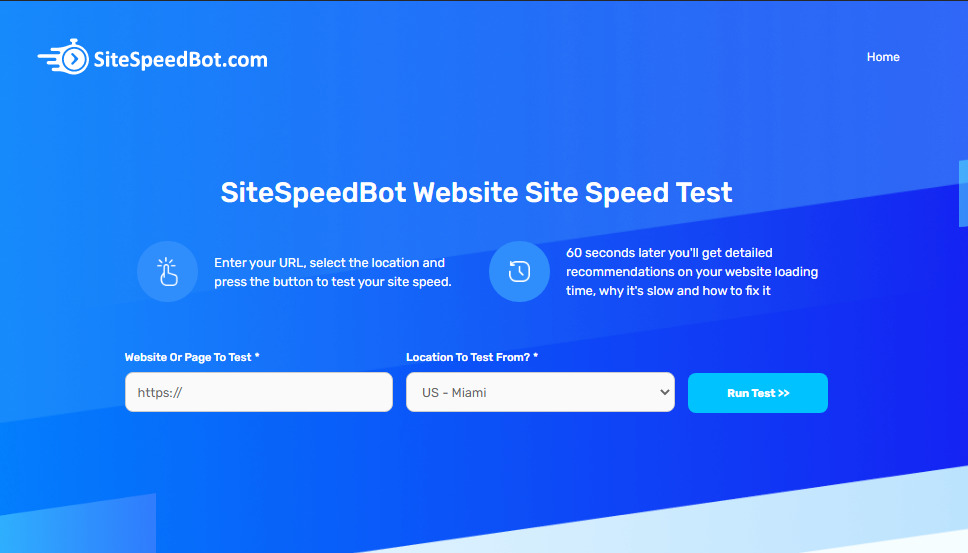
SiteSpeedBot is our speed testing tool of choice. It’s user-friendly and supplies you with useful information such as the number of received requests, the fully loaded time, the cumulative layout shift, the total blocking time, etc.
The diagnostic will take somewhere between a minute or two, and you’ll receive a full rundown on every aspect of the site that you’re testing.
SiteSpeedBot also brings FCP (render start) and LCP (render mostly finished) timing calculators, as well as a calculator that counts the number of sent-in site requests.
GTMetrix
GTMetrix is one of the oldest and best-known speed testing tools. Their website states that this testing tool has been used on 700+ million sites.
This tool lets you keep track of how your site is doing, and even alerts you when your page slows down. On the other hand, you will learn that some of the parameters GTMetrix tests are outdated and no longer relevant in terms of site speed, such as site rankings.
Google PageSpeed Insights
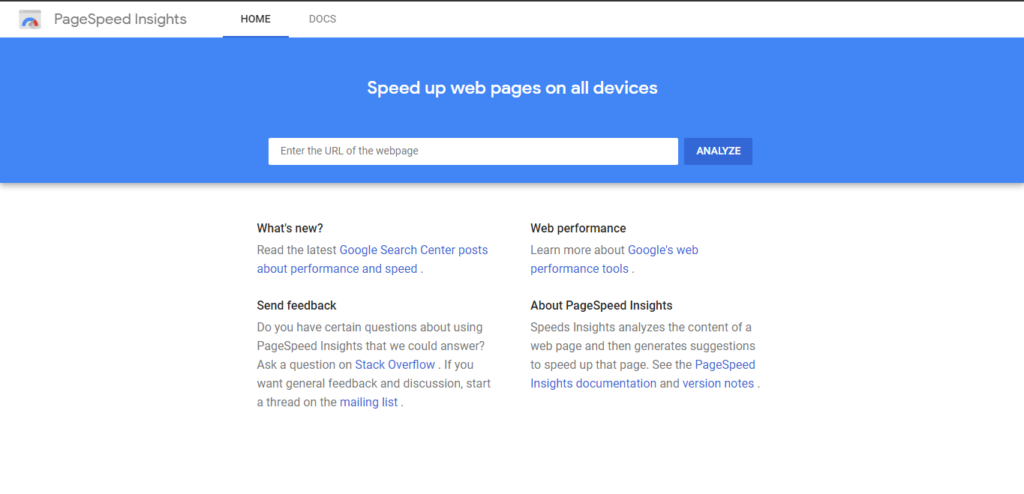
This tool is built to help you get the most precise numbers in terms of the Google ranking system. PageSpeed Insights is outstandingly user-friendly. It will feed you the results in no time. The biggest downside of this tool is the fact that it ignores the geographic location of the website, which implies that testing the site from different locations will provide you with varying results. It’s important to note that the real benefit of this tool is the technical checklist, rather than the speed testing tool.
Pingdom
Most speed testing sites will feed you statistics and then let you wander around looking for a way to boost your site on your own. Pingdom is different. It will always provide you with an actual suggestion on how to improve each side of your site’s performance that seems off in any way.
Pingdom tests and grades all aspects of your website, and even gathers info on content types that you have. Pingdom’s greatest weakness is that it’s not frequently updated to track any new parameters.
Database Optimization

When it comes to database optimization plugins, our suggestion is always WP-Optimize. This plugin will let you perform a SQL data optimization procedure that operates inside the WordPress backend console and allow you to delete any accumulated data bloat.
Over time, your site picks up and stores junk data that simply uses space in your storage, but isn’t of any use for anything. This unnecessary data is a result of your database growing all of the time. WP-Optimize is our tool of choice when it comes to disposing the unwanted information and clearing out the memory space.
Perfmatters.io
As we speak of unnecessary data, we should mention Perfmatters.io, a tool that will help remove the unwanted data from your site, and by doing that speed it up. The main purpose of Perfmatters.io is to continuously go through your site’s code and remove unwanted data such as scripts you no longer use, auto drafts, spam comments, transients, etc.
By disabling unnecessary scripts, your overall number of HTTP requests is automatically reduced, as well as your page size. And in combination with the database optimization feature, this plugin will speed up your site to the best of its abilities.
Perfmatters also offer lazy loading, CDN rewrite, preloading resources, and much more. All in all, it’s the best solution if your site generates big amounts of unused data.
Servebolt Optimizer

Converting the MySQL storage engine from MyISAM tables to InnoDB tables can improve your site speed, especially in the backend and on sites that get higher traffic. This is where the Servebolt optimizer comes in as the best tool for this conversion. Servebolt Optimizer is a WordPress plugin that can come in handy in various situations such as database optimizations, automatic Cloudflare cache purge, recommendations on additional performance boosts, and more.
Asset CleanUp
Asset CleanUp’s main feature is a script manager which lets you choose which Javascript and CSS files you want to disable. It comes with numerous settings which you can mingle depending on what your site needs. Other great features that come built in Asset CleanUp are bloat removal, preconnect, and CDN rewrite.
Autoptimize

These guys will configure Autoptimize to specifically suit your site, so you don’t have to mess with the settings by yourself and risk breaking something. You can also choose if you want them to configure your critical CSS. If you decide to go for the pricier package, Autoptimize even guarantees to return the money in case your site’s score doesn’t significantly improve when measured in Google Pagespeed Insights or Lighthouse.
Nitropack
When it comes to caching, Nitropack is one of the best plugins out there. It provides smart cache invalidation, device and cookie-aware caching, automatic cache warmup, and browser and session-aware caching. This plugin also comes very handy from the image optimization perspective. Their plans include lossy and lossless image compression, advanced lazy loading, WebP conversion, and adaptive image sizing. Nitropack also brings a global CDN service, HTML and JS minification and compression, an excellent proprietary speed algorithm, and more.
Speed Oriented Plugins
While the above-mentioned plugins have a specific role that consequently boosts site speed, the primary role of the plugins discussed below is solely improving your site speed.
Instant Page

Instant page is a speed optimization plugin that specializes in just-in-time preloading. It starts loading static content of the webpage as soon as the visitor hovers over the link. Instant page states that if a site visitor is hovering over the link for more than 65 ms, the chance for them to click on it increases by 50%. This process will speed up your website, and improve its user experience.
Another great side of Instant page is its ease of use. You just need to install the plugin and it starts working! Instant page is a great solution for those with no previous experience with websites and plugins.
On the other hand, we should also underline that Instant Page can be very handy even if you are more knowledgeable on the subject. Keep in mind that you can gain better control over the preloading of your site by setting the code manually.
Eve Dynamic Prerender
This tool has a purpose similar to Instant page. They both anticipate the next move, by using the mapped-out user navigation paths to predict which page the visitor will hit next.
Both Eve Dynamic Prerender and Instant Page try to guess what’s going to be the next click, even before the users make up their minds. Both plugins use those predictions to preload the section of the site that has the biggest chance of being open.
Multi-Purpose Tools
Contrary to the previous passage, the plugins described in the following paragraphs aren’t speed specialized. Their purposes are versatile, and they can help you speed up your site, but also complete many more tasks.
Autoptimize

Autoptimize is a great choice when minifying HTML, or scripts and styles. This plugin also comes in handy when optimizing your Google Fonts and images (with support compliant both to the AVIF and WebP image formats), minifying your site scripts, as well as the inline CSS.
Asset CleanUp
This plugin is an all-around tool able to minify CSS and JavaScript files, inline CSS files, reduce the HTML code of the actual page, defer combined JavaScript files, scan your page and detect all of the loaded assets, remove unused elements from the <HEAD> and <BODY>, and more. There’s also a Pro version of Asset CleanUp which comes with an even longer list of roles such as inline JavaScript files, defer the CSS loaded in the <BODY>, and so on.
Wordfence Security Plugin
This tool comes with an endpoint firewall and malware scanner, both designed to protect your WordPress site. Wordfence also includes the Threat Defense Feed which always keeps Wordfence up with new firewall rules, malware signatures, and malicious IP addresses needed to keep the site secure. This tool comes with a suite of extra features which make it stand out as one of the most comprehensive security tools out there.
Query Monitor
This tool will help you find out which plugins aren’t well optimized by pointing out particular themes or plugins. On top of that, it can also block editorial blocks, debug database queries, group those same database queries, and so on.
NitroPack
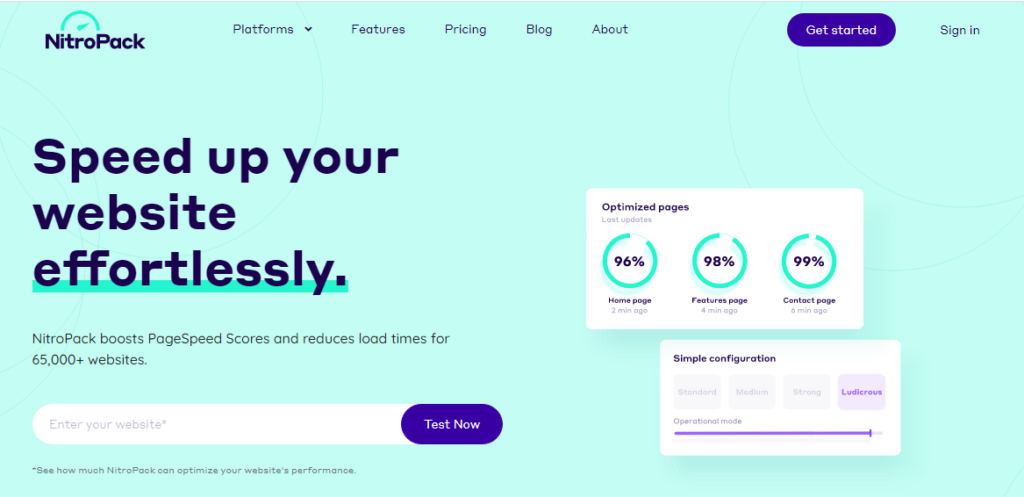
NitroPack is an all-around WordPress performance optimization service, and although it’s not technically a plugin, it surely deserves the place in this article. It includes all of the features essential for high site speed such as image optimization, caching, code minification, CDN, lazy loading, and much more. Nitropack is easy to set up, it performs all optimizations on the cloud, and initially optimizes the copy of your site to keep your files and data safe.
Lastly, if you’re considering Google AMP: Don’t.
Now that you know the best speed optimization plugins that can boost both your site performance and user experience, we would like to underline an optimization plugin we don’t find very helpful: Google AMP.
AMP uses Google Edge Caching on its network to quickly serve stripped-down versions of your web pages to the visitors. Simply put, this implies that you’re allowing Google to take control of your site.
Google is pushing themselves onto website owners and trying to capture more and more web traffic — you don’t need them to craft an amazingly fast experience. You can do it yourself.
Conclusion
This concludes our post on the best speed optimization plugins for WordPress sites. We hope you enjoyed the read! We suggest you try some of the plugins, except AMP, of course (🤭), for they should make a world of difference to your website speed and performance.
If you need any help, don’t hesitate to reach out to our team!